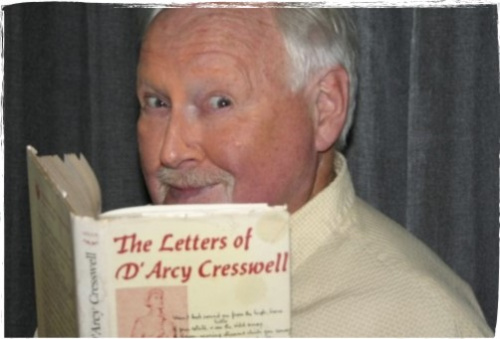ONE OF THOSE
BATS Theatre, The Random Stage, 1 Kent Tce, Wellington
21/10/2020 - 21/10/2020
Production Details
Funny, tragic and full of human interest, this is the story of Walter D’Arcy Cresswell the self-proclaimed “soldier poet”, and his relationship with Whanganui Mayor Charles Ewing Mackay.
A compelling tale of the relationship and its consequences.
BATS Theatre, The Random Stage
21 October 2020
6:30pm
Full Price $22
Group 6+ $20
Concession Price $18
BOOK TICKETS
Accessibility
The Random Stage is fully wheelchair accessible; please contact the BATS Box Office by 4.30pm on the show day if you have accessibility requirements so that the appropriate arrangements can be made. Read more about accessibility at BATS.
**
TAHI Festival
This performance is presented as part of and in collaboration with TAHI: New Zealand Festival of Solo Performance. This five-day festival is dedicated to showcasing Aotearoa’s finest, most engaging solo performance. TAHI gathers soloists from around the nation, and beyond – from established to emerging practitioners – to present work, collaborate and make connections across the industry. Alongside premiering and showcasing solo performances, the Festival provides opportunities for practitioners to extend the life of their performance work, to upskill, and to network through an integrated programme of performance, workshops, and forums. TAHI also seeks to foster relationships among tertiary institutions, actor training courses, secondary schools, BATS Theatre, and industry professionals.
Theatre , Solo ,
1 hr
Compels our empathy and earns the pathos
Review by John Smythe 22nd Oct 2020
I first became aware of Walter D’Arcy Cresswell in 2009, when the 1920 shooting incident involving Whanganui Mayor Charles Mackay was included in Ronald Trifero Nelson’s stage adaptation of the award-winning Mates & Lovers, A History of Gay New Zealand by Chris Brickell. That was just a snippet of a gay male history that traversed 140-odd years, so I jumped at the chance to revisit the story at the Tahi Festival with One of Those, written and performed by David Charteris, and directed by Mark Rayner.
We discover the Charteris embodiment of Walter D’Arcy Cresswell, arms crossed over his chest, beneath a brightly coloured (projected) wreath of flowers. It’s from his coffin, then, that he comments on his fate, and ‘rises’ to review and re-enact the events that punctuated his life before his self-inflicted demise in London, 40 years on from the Mackay debacle.
Railing at the ordinariness of his death after a lifetime of outrageously sampling the “smoooorgasbooord” of sexuality, following the war service that saw him wounded and awarded a couple of medals, his major gripe among many is that he will not be remembered for his poetry and prose plays: “Where is the Cresswell legend?” (In his 2008 biography, John Newton writes, “He is not remotely the poet he believed himself to be, and, judged on his verse alone, would long have been forgotten”.[i])
Inevitably, although elements of his literary output are touched on, it is the Whanganui incident that draws the most focus , both in the play and in historical accounts of his life.[ii] My Mates & Lovers review mentions I had to do further research to properly comprehend what exactly happened between Walter D’Arcy Cresswell and Mayor Charles Mackay, and why. And in the aftermath of One of Those, three of us find ourselves in animated foyer conversation sharing similar levels of confusion.
While there is a scene that covers it, we somehow haven’t registered that the RSA, embittered at being upstaged by the Mayor over the recent visit of The Prince of Wales, has engaged Cresswell to trap Mackay into revealing his homosexuality for a fee of £150. I sensed the assignations over dinners were leading to an intimate overture, so I’m surprised that Mackay’s ‘crime’ turns out (in the play) to be showing Creswell naked pictures of women. This is what leads to the demand for his resignation and the subsequent shooting (thanks, I gather, to Mackay feeling he had to be armed with a pistol for fear of attack by angry RSA members).
Nevertheless, although there are moments where he appears to be focussed more on remembering lines than reliving the moments, Charteris does capture the essence of Creswell’s vexed and vexing persona, comprehensively manifesting the characteristics listed in the programme: “self-proclaimed poetic genius, wife and child deserter, philosopher, sponger, scab, snob, sycophant, hypocrite, interfering prig, blackmailer and cad.”
Despite Cresswell’s obvious failings, there is a touching poignancy in the way he wallows in his bitter-sweet memories while working as the night watchman at Somerset House, singing popular songs of the time as he does his rounds by torchlight. And there’s a social history embedded in the tale, enhanced by his dropping such names as Allen Curnow, John A Lee, Sir Robert Stout (the judge at Mackay’s trial for attempted murder), katherine Mansfield, Robin Hyde (nee Iris Wilkinson) … And he sees poetic justice in what befalls Charles Mackay.
His swansong is a tear-soaked rendition of ‘Swanee’ and his epitaph is a publisher’s rejection letter. As an example of the human tendency to feel greater than others realise and embittered at not being recognised as such, One of Those will resonate with many ‘ordinary people’. By portraying Cresswell ‘warts-and-all’, David Charteris compels our empathy and earns the pathos that attends the ending.
[See Nik Smythe’s review of the 2014 Q Theatre season here.]
[i] Newton, John (2008). “D’Arcy Cresswell, 1896–1960”. Kōtare: New Zealand Notes and Queries. 7 (3): 129–136. ISSN 1174-6955
[ii] A search of the various records, online (e.g https://nzhistory.govt.nz/wanganui-mayor-charles-mackay-shoots-poet-darcy-cresswell ) and in print (e.g. Michael King’s The Penguin History of New Zealand, pp 376-7) offer differing accounts.
Copyright © in the review belongs to the reviewer





Comments